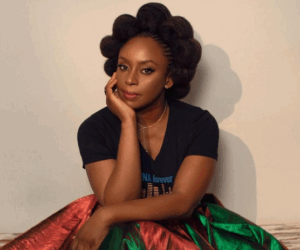When news broke that Chimamanda Ngozi Adichie had received something called the Mermaid Award, it sounded almost mythical, like a title pulled from a fairytale rather than something literary. But behind the playful word is one of Europe’s most meaningful tributes to storytelling.
This award, presented by the Gothenburg Book Fair in Sweden, isn’t about fantasy or fiction alone. It celebrates writers whose words have deeply moved Swedish readers, and in 2025, that honour went to Chimamanda, a Nigerian author whose voice continues to go far beyond the pages of her books.
Read Also: 10 Books Everyone’s Talking About on #BookTok Right Now
What Is The Mermaid Award?
20/20/2020 remains a dark point in Nigeria’s history; one that can never be forgotten.
Bam Bam stuns as an Igbo bride in Rosie Young’s Akwaete design for Love in Every Word: The Wedding, Omoni Oboli’s record-breaking sequel.
Trouble seems to be brewing in the Ned Nwoko home.
The Mermaid Award traces its roots back to the early days of the Gothenburg Book Fair, founded in 1985 by Bertil Falck and Conny Jacobsson. The story goes that during preparations for the first edition, the fair’s founders stumbled upon a plastic bag featuring an image from the 500th-anniversary celebration of The Little Mermaid: Hans Christian Andersen’s tale of longing and transformation.
&format=jpeg)
The Little Mermaid Statue in Copenhagen, Denmark
That image would inspire the fair’s logo, later refined into a formal design by Swedish artist Bo Berndal. Over time, the mermaid became more than a symbol for the fair itself; it came to represent the magic of literature, the power to enchant, to challenge, and to connect worlds.
When the Gothenburg Book Fair introduced the Mermaid Award, it chose to honour writers whose works stir something deep in readers’ hearts, echoing the mermaid’s blend of mystery, vulnerability, and strength.
Inside the Gothenburg Book Fair
To understand the weight of the award, it helps to know where it comes from. The Gothenburg Book Fair is the largest cultural event in the Nordic region and one of Europe’s most respected literary gatherings. Each year, more than 80,000 visitors, from teachers and librarians to authors and curious readers, gather to celebrate storytelling in every form.
Beyond the books and seminars, the fair has become a space for cultural exchange and reflection. It hosts over 800 exhibitors and 300 discussions ranging from politics to poetry, all under one roof. In 2024, the first Mermaid Award was given to American writer Joyce Carol Oates, who described the hand-carved statuette as the essence of a mermaid, the spirit of a woman who is really a spiritual being.
That same figurine, sculpted by Swedish artist Panos Mamakos, now sits in Chimamanda’s hands, a piece that captures both tradition and imagination.
Why Chimamanda Fits the Spirit of the Mermaid
The Mermaid Award feels almost designed for a writer like Chimamanda. For decades, her stories have passed effortlessly between continents and emotions, carrying readers from Nsukka to London to Lagos. In her acceptance speech, she reflected on what the recognition means to her:
“I am grateful for this award that recognizes my vocation, for that is what writing fiction has always been for me: a vocation, the defining center of my life. I am as moved by the rich literary symbolism of the mermaid as I am by the knowledge that my work has deeply touched Swedish readers.”
A Nigerian writer, inspired by Igbo storytelling traditions, received a Scandinavian prize rooted in an old Danish fairytale. This is a reminder that literature truly has no borders.
Read Also: Chimamanda Ngozi Adichie: Full list of her books (which have you read?)
The mermaid, throughout history, has been a symbol of attraction and independence, a being who exists between two worlds. In a way, so does Chimamanda. Her work often explores the spaces between cultures, identities, and expectations. You can see it in most of her books: Purple Hibiscus, Americanah, or The Thing Around Your Neck, she gives voice to characters navigating in-between realities.
To Swedish readers, her stories resonate because they bridge differences. They’re both deeply Nigerian and universally human, and filled with questions about love, belonging, and who gets to tell their story.
That depth mirrors what the Gothenburg Book Fair stands for: literature as a force that stirs the soul, challenges complacency, and connects people through empathy and imagination.
The Celebration
By honouring Chimamanda, the fair acknowledged her literary achievements and her role as a cultural bridge. She is one of Nigeria’s most decorated contemporary writers, yet her influence moves far beyond our national pride. Her essays have sparked global conversations about feminism and identity, while her novels continue to inspire readers across languages and continents.
The Mermaid Award might sound playful, but at heart, it represents a writer who, like the mythical creature it’s named after, draws people in with the beauty of her voice and leaves them transformed.
So yes, Chimamanda Ngozi Adichie now joins the ranks of Joyce Carol Oates as a Mermaid Award recipient.


![#EndSARS protesters in 2020 [VMT News]](https://image.api.sportal365.com/process/smp-images-production/pulse.ng/26092024/4e09c5ab-aa42-4d7a-a565-0b2d1000e16b?operations=autocrop(140:79)&format=jpeg)
&format=jpeg)
&format=jpeg)






